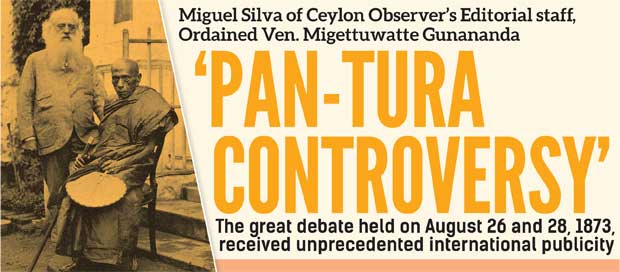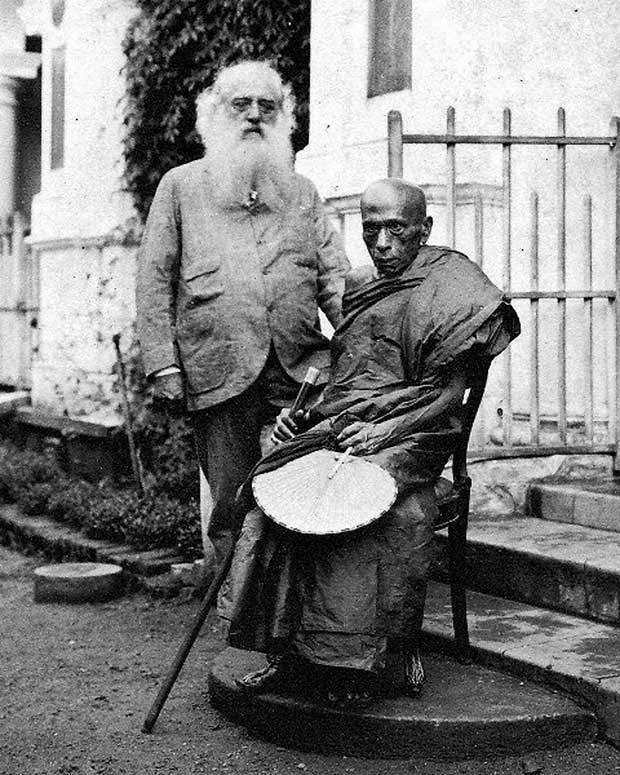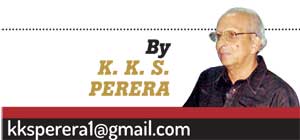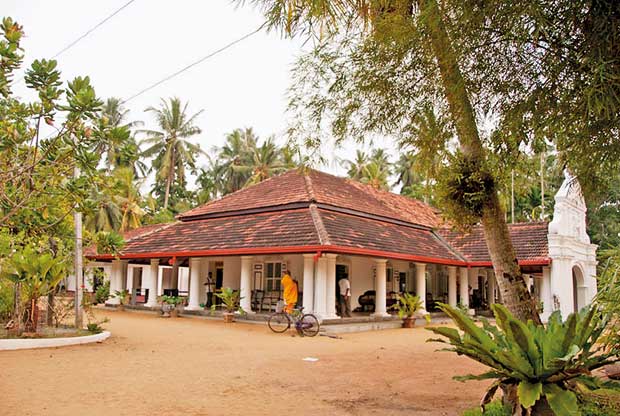Reply To:
Name - Reply Comment
Last Updated : 2024-04-26 20:44:00

 iguel Mendis Silva studied at Wesley College, Colombo, where he excelled in Christianity (Methodist), English and Latin. Young Miguel had to travel to his home town, Migettuwatte in Balapitiya for his mother’s funeral; the high priest at the village temple who happened to be his uncle did not allow his nephew to return to the editorial desk at The Observer, instead he was ordained for the second time as Migettuwatte Gunananda, who launched the Buddhist revival programme whilst resident at a temple in Kotahena.
iguel Mendis Silva studied at Wesley College, Colombo, where he excelled in Christianity (Methodist), English and Latin. Young Miguel had to travel to his home town, Migettuwatte in Balapitiya for his mother’s funeral; the high priest at the village temple who happened to be his uncle did not allow his nephew to return to the editorial desk at The Observer, instead he was ordained for the second time as Migettuwatte Gunananda, who launched the Buddhist revival programme whilst resident at a temple in Kotahena.
With the Dutch invasion of the coastal belt in mid 17th Century, Christian missionaries arrived in the island. ‘Pan-tura Controversy’ (as known by the print media in 1870s) is the story of the world famous ‘Panadura Vaadaya’, the Buddhist-Christian debate that rejuvenated the Buddhist Revival Movement.
The missionaries prevented colonial governments from patronizing Buddhism and other faiths in the Island. A section of the locals accepted the faiths of missionaries and even emulated their culture, leading to the degeneration of the centuries-old Buddhist culture and habits. Protestants played a leading role in the development of national educational institutions. The Bikkhu Sasana was totally neglected and most of the Sinhalese people were ashamed to call themselves Buddhists. The establishment of schools and the distribution of books on Christianity were the weapons used to convert people to Christianity. ‘Christian Pragnapthi’, written by a Wesleyan Father in 1849 for free distribution, was successful in making Buddhists change their faith. A learned Buddhist monk authored a reply titled, ‘ Durlabdi Vinodani’-1862. The author was Vadibha-Sinhe Migettuwatte Hamuduruwo (Ven. Migettuwatte Gunananda).
Earlier, in the 16th Century, Portuguese arrived in the island, established their rule in the coastal areas. Using their military powers they set up trading, they also destroyed Buddhist and Hindu places of worship and spread Catholicism. The British in 1817 abolished the Poya holiday.
Miguel Silva was born in Balapitiya on February 9, 1823 was first ordained at the age of 12. After three years, for unknown reasons he disrobed. Miguel’s fortune brought him luck when he met Mudaliyar Abraham Abeysiriwardene. He admitted Miguel to Wesley College, Colombo. On completion of school education he got an opportunity to join the Ceylon Observer’s editorial staff.
The Revivalist Movements gathered momentum as harassment on Buddhists and Hindus continued. Migettuwatte Thera was joined by Hikkaduwe Sri Sumangala, Bulathgama Dhammarakkitha and several other monks in countering missionary propaganda through leaflets, posters and other material. In early 1865, this group of Buddhist revivalists challenged the Christian missionaries for an open debate. The first was held in Ganegama, Baddegama on February 8, 1865. Reverends, George Parsons, David Silva, laymen Gunawardene and Bough represented the Christians. The second was in August 1865 at Waragoda, third at Four Korales Udanwita on February 1, 1866, where an ex-monk John Edward Hunupola joined the Christian team. On June 9 and 10, 1871, Migettuwatte Thera met a team of Christians in a debate at Gampola. In a similar debate in Gampaha created an unexpected situation where a rift between various sects of Christians transpired. The Dutch Reformed Church (DRC) targeted the Catholics widening the rift through attacks in publications. There the Buddhists supported the views of the DRC. The Church of England joined the Wesleyans during this time, while Roman Catholics renewed their struggle with Buddhists. ‘Gnanartha Pradeepa’ came into publication in 1866. The Journal, ‘Vibhajja Vadaya’ carried articles by Gunananda Thera challenging the authorship of the Bible, to which Rev. David de Silva of Wesleyan mission replied. Around this time, Rev. Silva delivered a lecture highlighting Buddhist perceptions on the concept of ‘Soul’ at the Wesleyan Chapel on June 12, 1873; to which Ven. Mohottiwatte Thera replied at the famous Rankoth Viharaya (Galkandhe temple) in Panadura. Lecture was arranged by Jeramius Dias and C. Cornelis Perera (Jeramius Dias was the father of Arthur Dias Alias ‘Kos Mama of Panadura’ and husband of lady Selestina Jeremius Dias, the philanthropist who donated land and buildings for Vishaka Vidyalaya, Colombo).
 Hikkaduwe Sri Sumangala Thera and Colonel Henry Steel Olcott in Colombo, 1889
Hikkaduwe Sri Sumangala Thera and Colonel Henry Steel Olcott in Colombo, 1889
Saner counsel prevailed and they decided to meet ‘face to face’ and debate it to an end rather than battling it out over print media and individual lectures. The Christian party wrote on June 26, 1873 to the Buddhists under the signature of Advocate Peter Daniel and Mathes Gunawardene (letter is preserved at Archives). The letter requested that a venue and a date for the debate be arranged.  Before responding to the letter, two Buddhist leaders first met Ven. Migettuwatte Thera at his Kotahena temple to seek his advice. Then they wrote back on July 9, agreeing to the proposal and recommended they met to discuss the arrangements. Accordingly, the two parties fixed the date as August 26, with Jeramius Dias volunteering to provide all infrastructure, including a shed in Dombagahawatte in close proximity to the Panadura beach. The two parties further discussed laying down rules and conditions.
Before responding to the letter, two Buddhist leaders first met Ven. Migettuwatte Thera at his Kotahena temple to seek his advice. Then they wrote back on July 9, agreeing to the proposal and recommended they met to discuss the arrangements. Accordingly, the two parties fixed the date as August 26, with Jeramius Dias volunteering to provide all infrastructure, including a shed in Dombagahawatte in close proximity to the Panadura beach. The two parties further discussed laying down rules and conditions.
1. August 26 and 28 were the two dates reserved for the debate.
2. All points raised by the speakers had to be backed by reference to scripts.
3. Nominate one person from each party to record the proceedings. It should be a verbal debate.
4. A speaker was allowed one hour at each turn.
5. The first hour had been restricted to a Christian speaker to make statements adverse to Buddhism, to which the Buddhist would reply at the second hour and use the opportunity to raise arguments against Christianity.
6. While the debate was on, there should not be any disturbances or interferences; it was the responsibility of the signatories to maintain harmony and decorum.
7. Both parties had to ensure that peace prevailed throughout the two days.
8. The debate had been held in Dombagahawatte, Pattiya in a shed constructed on the location, close to the Panadura beach.
9. Times allocated had been 8.00 am to 10.00 am in the morning and 3.00 pm to 5.00 pm in the afternoon.
Mathes Suwaris Gunawardene - On behalf of Christians.
Kurukulasooriya Cornelis Perera - On behalf of Buddhists.
A foreign Christian priest, who attended the debate, wrote,
“The most remarkable incident in my first three months of missionary experience and one of the most remarkable things I have ever witnessed was the great controversy, Christianity versus Buddhism. …when we arrived at the place… we found that thousands had got there before us. A picturesque scene could hardly be imagined than the one which presented itself to us as we sat on the platform…the clock struck nine, priest, Ven. Migettuwatte arose and commenced his address on the Buddhist side. …his manner as he rises to speak which puts one in mind of some orators at home…he showed a consciousness of power with the people…his action is good and the long yellow robe thrown over one shoulder helps to make it impressive. His powers of persuasion show him to be a born orator.”- Father S. Longdon; ‘Ceylon Friend’ - September 1873
Courtesy; BTS - journal: Colombo 1940
Dr. J. M. Peables, visiting from America during the debate, returned home and published a manuscript titled ‘Buddhism and Christianity Face to Face,’ in 1875, based on a text he borrowed from John Capper, the Editor of ‘The Ceylon Times’. It was titled ‘A Full account of the Buddhist controversy held at Pan-tura in August 1873. It was this book that made Henry Steele Olcott become a Buddhist and arrive in the island.
In 1711, the rulers, influenced by Missionaries enacted laws banning the practice of Buddhism and Hinduism naming them as ‘cannibal-faiths’. Ven. Migettuwatte Thera had to argue with several scholarly Christian priests who were well acquainted with Buddhist scriptures and the Pali Language. The Christian advisory team comprised Wesleyan Priests; B. Clouch, the editor of the Sinhala-Pali Dictionary, William Harvard, who authored books in Sinhala, D.J. Gogerly, a Buddhist scholar and Spence Hardy, a Buddhist scholar. Reporting on the first day’s proceedings, ‘Ceylon Times’ (later, Times of Ceylon) special reporter says,
 Dharama (sermon Hall) Salawa, Welipitiya Temple, Nalluruwa, Panadura where Olcott addressed 4000 people during the May 1880 visit of the Theosophists
Dharama (sermon Hall) Salawa, Welipitiya Temple, Nalluruwa, Panadura where Olcott addressed 4000 people during the May 1880 visit of the Theosophists
‘…long before the hour, thousands of natives were seen wending their way, attired in their gayest holiday suites, in to the large enclosure in which stood the ample bungalow where the adversaries were to meet. By seven the green was one sea of heads. Each district has sent its quota of villagers, and Colombo was represented by a few intellectual looking, silk garbed young Sinhalese, determined to give up all for the great champion of Buddhism .The Protestant party, too was very strong. From Monday, catechists and clergymen of every denomination , Baptists, Wesleyan and Church Missionary, flocked from all parts of the island into the large house prepared for them… the temporary building the scene of this polemical strife, was a neat cadjan-roofed structure with a raised platform, and parted in the middle; one portion was occupied by the Rev David de Silva and his party, and the other by Ven. Migettuwatte Thera along with several learned Nayake Bikkhus…’
On one side of the hall were Rev. David, S. Coles, S. Lagden, Catechist F. S. Sirimanne, R. Tebb, C. Joe Fernando, Jayasinghe, P. Rodrigo, Nathanielsz, J. H. Abhayasekera, G. J. Gunasekera, Juan de Silva, Dr. Staples, and Proctors Jayasinghe, Daniel and Alwis, Mudaliyar de Soysa, and Hunupola Nilame. On the other side, Ven. Migettuwatte Gunananda, Ven. Waskaduwe Sri Subhuti, Ven. Hikkaduwe Sri Sumangala, Ven. Potuvila Indrajoti, Ven. Talhene Amaramuli, Ven. Koggala Sanghatissa, and Ven. Mulleriyawe Guneratana Theras.
Rev. David de Silva, Pastor of the Wesleyan Mission, Panadura and a Pali/Sanskrit scholar made the first presentation at 8.00 am on August 26, 1873. He spoke in Sinhala quoting from scripts on the notion of the soul saying the ‘doctrine of Dhamma’ is centred on soul, and according to Buddhism the Satta, sentient beings are constituted in the five Khandhas quoting from the Samyukkthanikaya he named rupakkhanda the organized body, vedanakhanda the Sensations, sankharakhanda the reasoning powers, sannakhanda, the perceptions, and vinnanakhanda the consciousness.
The Ceylon Observer and Ceylon Times sent special correspondents to cover the event. The correspondents were required to observe rules laid down on fair reporting. However, it appears that the Observer, where Ven. Gunananda Thera himself was attached to, slanted the news in favour of the Christians. The writer came across a Letter to the Editor, (Dr. George Eliot), by a reader, in September 5, 1873 issue of CT (courtesy, National archives), challenging the Observer Correspondent over ‘…utterly unfounded’ comments…:
‘…Ven. Migettuwatte had to give into his superior in Pali, Rev. David Silva, on three very material points…the priest lingered and still lingers along with his confrères, to attempt to answer…”
The debate revolved around the concepts ranged from God, nirvana , soul, rebirth, karma, and the doctrine of dependent origination. Rev. Silva spoke on the concept of ‘no soul’or irreducible ‘self or Aatma’ in Buddhism, quoting the Tripitaka. Rupambhikkhaveanattam,yadanattamn’etam mama n’eso‘hamisminesoattati, meaning, ‘Organized form monks is not self, that which is not self is not mind, I am not that, that is, not to me a soul.’ He claimed that this meant that there was no basic difference between humans and the rest of the animal kingdom. Also he argued that there would be no rewards and penalties after death for what one has done in this life, no soul or Anathma, meaning that one would have nothing to fear if one committed sin. And he extensively quoted the Bible to the effect that we do have souls.
Ending his first speech he thanked the 5000 strong audience for quiet and attentive listening. The Times reporter says, “It is doubtful whether there were even 30 out of 5000…, who even understood the ornate… his rendering of Pali Extracts may be correct, but who was to judge this?”
Migettuwatte Thera in reply took a swipe at Rev. David’s command of the Pali language, proposing that someone who makes fundamental errors in it cannot be expected to comprehend the insightful metaphysics clarification in how rebirth works in the absence of a ‘soul’: that there is some kind of continuity that goes away from the death of physical body.
He challenged that some Bible translators have committed various deceptions, like interpreting ‘jealous’ into Sinhalese jwalita, which means glittering. And also of leaving out verses like Leviticus 17:7, saying, they should not make offerings to deities that they had prostituted themselves to. In conclusion he appreciated Catholics who have not re-written their Bibles in the style some Protestants do. The ‘Pan-tura Controversy’ thus created quite a stir in all parts of the world. (Space constraints prevent discussing the other three sessions)
The enthusiasm and sentiments created by the debate and the impact of the Thera’s personality had lasting effects on generations of Buddhist revival programmes. He took over the opposition, making all four re-joiners billed for Buddhists, while Rev. David Silva and Fr. Sirimanne argued for the Christians. Both parties assumed in their victory. The people in attendance at the site thought that the Buddhists won as Ven. Migettuwatte Thera silenced the opposition with his outstanding oratory. Among those who converted to Buddhism, after reading Peables’ booklet on the debate were Col. Olcott from America and Ms. Petrona Blavatsky and Prof. Evan Pavulavich from Russia. It revived the identity and pride of Buddhists, and also to some extent Hindus, Muslims and even Catholics. On the final evening, the jubilant crowd raised cries of ‘sadhu, sadhu’, as the atmosphere became intense, Ven. Gunananda Thera warned everybody to be silent and disperse calmly. The great order which prevailed throughout was unbelievable.
The Dhamma, however, is not a doctrine, a philosophy or an ideology for scholarly or academic studies, or for that matter for debate. In Kalama sutta, Buddha said, ‘Do not believe just because something fits with the reasoning of logic.’It is to be realized by oneself through one’s own efforts. A matter of ‘proving or disproving’ in a debate does not arise. In Cricketing parlance, what is important is not ‘who won or who lost’, but the exemplary manner in which the debate was conducted; and more significantly the impact it had and the final outcome, the resurgence of Buddhist Revival Movement and the publicity it received.

Add comment
Comments will be edited (grammar, spelling and slang) and authorized at the discretion of Daily Mirror online. The website also has the right not to publish selected comments.
Reply To:
Name - Reply Comment
US authorities are currently reviewing the manifest of every cargo aboard MV
On March 26, a couple arriving from Thailand was arrested with 88 live animal
According to villagers from Naula-Moragolla out of 105 families 80 can afford
Is the situation in Sri Lanka so grim that locals harbour hope that they coul